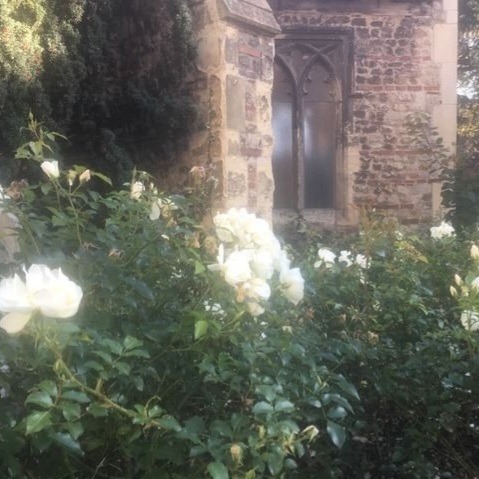Bibliophile. The Nymphai. Quadruple Sagittarius. Tarot. Ardent Nostalgist. Rainstorms. Witch. PNW. Pescetarian. Ancestors. Star of the Sea. The Dead. Hestia.
Don't wanna be here? Send us removal request.
Text
if you're having one of those nights again
here is a good dog scratching itself. it is from a fragment of a kylix (drinking cup) in the manner of the euergides painter ~500 BCE, and currently lives at the MFA Boston.

it's very similar to another dog on a cup attributed to the euergides painter that is housed in the ashmolean museum:

the most important part of all of this is that there is an open access paper here titled "Seeing the Dog: Naturalistic Canine Representations from Greek Art," which includes this delightful sentence:
"Onomatopoetic Greek words include the following: “βαύ, βαύ (bau bau); βαυβίζω/βαυβύζω (baubizō/baubuzō); and especially βαΰζω (baüzō); “ὑλάω (hulaō) would appear to imitate a howl. Ἠπύω (ēpuō), normally “roar”, seems to indicate loud barking at Aristophanes."
1K notes
·
View notes
Text
This is a post for disabled people. For mentally ill people. For low energy people.
This is a post for people who work three jobs and look after their kids.
This is a post for people who are TIRED. sick. Struggling.
The Gods will not abandon you.
Even if you don’t worship every day, the Gods will not abandon you.
Even if you can’t pray regularly, the Gods will not abandon you.
Even if you can’t put together offerings, the Gods will not abandon you.
Even if you stumble,
The Gods will not abandon you.
They will not punish you for the crime of being human. They know you are not divine. They know you are imperfect. They do not expect greatness and perfection, they just expect respect and humility.
Stay humble. Stay consistent. Show your reverence in whatever way you can. Keep them in your thoughts before you go to sleep at night.
The Gods know you.
DISCLAIMER: this is my personal interpretation. Obviously beliefs differ and the ancients would have thought very differently. This has just been my experience.
2K notes
·
View notes
Text
I feel like people these days put too much value in physical offerings. Like, yeah some food and whiskey makes good offerings... But have you considered offering your time? Actions make just as good offerings. Like, you could learn a new hobby in honor of your ancestors because they themselves liked that hobby too. You could learn to play an instrument for them. You could literally just nod your head at their altar in acknowledgement. Time has just as much value as physical offerings.
1K notes
·
View notes
Text
Ash Wednesday or Ugly Wednesday (lat. dies cinerum or feria quarta cinerum) is the first day of the Lenten season in the Roman Catholic liturgical calendar. Its date falls on the 40th day before Easter; Sundays are not counted in these 40 days, so in practice Ash Wednesday falls on the 46th day before Easter Sunday. Because of the irregular date of Easter, its date varies from year to year.
The name of the day comes from the custom of burning palm trees or mudpies from Palm Sunday last year. The ashes thus obtained are used in the Ash Wednesday service, when worshippers are marked with ashes on their foreheads; this symbol refers to the Middle Eastern tradition of sprinkling ashes on one's head as a sign of repentance before God.
According to the old custom, Ash Wednesday consisted of some Lenten soup and pasta with poppy seeds ('válkov', or 'šúľance'). The more pious women would eat something in the evening to stave off their hunger. Traditional Lenten dishes included, for example, Lenten porridge, sorrel sauce with egg, mashed beans, cabbage rolls and soups. A well-known sweet delicacy was kalkýš (kelkiš, keltýš, bírač), which tastes like gingerbread.
4 notes
·
View notes
Text
Simple ward I use but haven’t seen online:
Requires no tools, only visualization and concentration.
Stand before the entrance you are trying to ward (window, mirror, door, etc)
In one hand you hold the brightest light and in the other you hold the darkest void. Concentrate on both at once. Raise your hands to the top corners of the entrance. Infuse one corner with dark and one with light. Slowly bring your hands down to the bottom corners in an X formation. As you do, something like tv static should fill the space between your hands and the corners. Reach the opposite corners with arms crossed. Infuse these corners with light and dark. Pour out everything that’s left in your hands and then bring them up and back to your sides. The entrance is warded.
This ward, in my opinion, makes entrances “invisible” or hard to notice and find. The goal is that whatever might be looking to come in simply can’t see the entrances. I think it works great in conjunction with other wards specifically designed to block entry.
33 notes
·
View notes
Text
my whole aesthetic be like: dark coffee, vintage women smoking, venerating the old gods to carry on my ancestor's wrath
18 notes
·
View notes
Text
You need to care for yourself to care for your craft. 🛁

264 notes
·
View notes
Text
🌙Lunar Cycle Witchcraft
Here’s some of my personally gathered information on moon phases, eclipses and some other witchy moon stuff, feel free to incorporate this information into your craft/blog/etc! I may add onto this post occasionally, we’ll see :)
Phases:
New Moon: Set intentions, New beginnings, deconstructive magic, curses, banishing, soul searching, divination, beauty, health, money, decision making & midnight magick. First Quarter: Grounding, building & channeling energy, creativity, divination, motivation, calming, strength & growing. Full Moon: Peak energy, full bloom, releasing, love magic, banishing, charging, cleansing, healing & clarity. Last quarter: Acceptance, forgiveness, transformation, breaking bad habit, relinquishing, breaking curses & banishing. Waxing Crescent: Taking actions, aligning focus, gaining energy, constructive magic, attraction, wealth/success, luck & friendship. Waxing gibbous: Taking stock, tuning in, listening & motivation. Waning gibbous: Releasing control, receiving, opening space, relinquishing, undoing bindings, cleansing & undoing curses. Waning crescent: Reflection, renewal, rest & restoration, balance, success, attaining wisdom, atonement & illness.
Eclipses & Other Rare Occurrences:
Blue Moon: Rituals, Protection, Guidance, Power Boost, Divination, Light magic, Obtaining Goals & Positive change. Super Moon: increase in moon’s energy Blood Moon: Ridding oneself of bad habits, prophecy, spirit conjurations, healing, protection, manifestation, balance & transformation. Lunar eclipse/solar eclipse: renewal,, moon showing all phases due to earth blocking sun from the moon
1 Year of Full Moons
January: The Wolf Moon Relationships & Protection February: The Snow Moon Nearing the End of Winter & Gaining Focus March: The Worm Moon Rebirth & Spring April: The Pink Moon Abundance, Fertility & Growth May: The Flower Moon Blooming & Positive Relationships June: The Strawberry Moon Summer, Exploration & Expansion July: The Buck Moon Reflection, Cleansing & Growth August: The Sturgeon Moon Things Coming Into Being & Changes September: The Harvest/Corn Moon Reaping What You’ve Sown & Changes October: The Hunter Moon Honoring the Dead & Exposing Hidden Things November: The Beaver Moon Settling In, Rest & Rejuvenation December: The Cold Moon Long-Term Goals, Strength & Winter
548 notes
·
View notes
Note
Sadly it took me 17 years on this earth to find out that people outside of Greece practice Hellenism. When will you white people ever stop appropriating our culture. Hellenism is a religion bound to Greece, our history, blood, language and culture. Things you will never be part of. Or be able to properly practice since the traditions are BOUND to places in Greece. The gods will never respect your ugly xeno blood anyway, but not like you'll ever learn, even if a native tells you that.
Ah, great. Very Anon, much brave. But, like with every single ask I get, I will answer it with respect and information. Ancient Hellenic society was notoriously strict about who was part of it and who was not. If you were not a citizen, you were either a doûlos–slave–or a métoikos, more commonly referred to as ‘metic’. All three classes had their parts to play in Classical Hellas. In Athens, about half of the population were doûloi and métoikoi. Métoikoi were citizens of other Hellenic cities and beyond who came to Athens because of the unique opportunities the metropolis offered. Doûloi who bought their freedom also became métoikoi. Because of their skill sets, métoikoi were welcomed with open arms in Athens, but they very rarely became neutralized citizens; the best they could hope for was to become an isoteleia. As an isoteleia, they were freed from the liabilities the métoikoi had. Former slaves never received either status; isoteleia or citizen.In Athens, métiokoi, while welcomed, were disadvantaged from the get-go. They had to register their status within a month of arrival. They had no political influence, were not entitled to governmental aid in case of emergencies, the could own no farm land or real estate unless they were given special permission by the government, and they were not allowed to procure a contract with the government to work the mines. They were, however, expected to enter the army, and pay taxes if they were wealth enough, like citizens. On top of that, they also had to pay a métoikoi poll tax–the metoikon–which was twelve drachmas ($ 720,-) a year for men and six for women, as well as another special tax–xenikon telos–if they wanted to set up a stall in the market place.Like doûloi, métiokoi did have access to the judicial system; they could both prosecute others and be prosecuted themselves. Unlike citizens and very much like slaves, métiokoi were not allowed to represent themselves; they needed a citizen to vouch for them–a sponsor, called prostates. For a freed slave the sponsor was automatically his former owner. Métiokoi were entitled to take part in religious ceremony. Like slaves but unlike citizens, métiokoi could be made to undergo judicial torture. The penalties for killing a métiokoi were not as severe as for killing a citizen. Although doûlos could become métiokoi, it was fairly easy for métiokoi to become doûloi; a failure to pay the metoikon tax, not finding a citizen sponsor, causing trouble, marrying a citizen or claiming to be a citizen themselves could all cost them their status.The term ‘métiokos’ began to lose its distinctive legal status in fourth century BC, when métiokoi were allowed to act in the court without a prostates, and came to an end in Athens, when the purchase of citizenship became very frequent. Until that time, citizenship was a guarded treasure. While citizens, métiokoi and doûloi were indistinguishable in appearance and behavior, society functioned largely on their separation.Outside of Athens, métiokoi were not treated as equally. Of all the poleis, only Corinth had a decently seized population of métiokoi. Their legal status is unknown, however. In Sparta and Crete, foreigners were hardly ever allowed to stay.Many famous contributors to Athenian culture and Hellenic history–like the philosopher Aristotle and the painter Polygnotos–were not Athenian citizens. Many builders of temples, as well as some of the richest businessmen and women weren’t Athenian citizens. Egyptians, Cypriots and Phoenicians, all came to Athens and founded their own districts, with temples in which they could pray to their own Gods. As for worshipping the ancient Hellenic Gods: in the religious sphere all métiokoi were able to participate in the festivals central to the life of the city, except for some roles that were limited to citizens. Only citizens could be priests, for example. In ancient Hellas, the role of priest(ess) was a largely temporary, governmental, function. The profession of priest could be bought, and usually only lasted a few years at best. Minding a temple was almost exactly like minding a house; clean-up, clean-up, clean-up. In fact, religious celebrations weren’t led by the priest(ess), but by the magistrate or other high ranking government official. The sole task of the priest(ess) was the animal sacrifice, but that was vitally important.Now, as for the Hellenic Gods being somehow bound to Greece—many, if not all members of the Hellenic pantheon were imported into it from other places or the remnants of older religions. Zeus is the Greek continuation of ’*Di̯ēus’, the name of the Proto-Indo-European God of the daytime sky, Hera most likely already existed for the pre-Hellenic people who moved into the area. Archaeologists suspect that Athena, Médousa and Poseidon found their origins in Libya. They came to Hellas through Crete at the dawn of Hellas. In the beginning of Her rein, Athena may have been a snake and fertility Goddess and Poseidon solely a God of horses. Scholars have long suspected that Dionysus is in fact a fusion of a local Greek nature God and another more potent God imported rather late in Greek pre-history from Phrygia (the central area of modern day Turkey) or Thrace. Aphrodite’s oldest non-Greek temple lay in the Syrian city of Ascalon where she was known as Ourania, an obvious reference to Astarte. I really could go on and on and on.Anon, I understand your frustration. In this time of economic hardship and foreign interference in your country, the last thing you are open to is the—what you consider—appropriation of your ancient Gods. But here is the thing: the ancient Hellenes were open to allowing non-Hellenes to worship the ancient Gods because they understood that the Theoi appreciate worship—from anyone. It is Their due share; a sign of respect as shown in The Odysseia. The colour of my skin has nothing to do with my ability to worship the ancient Hellenes. Even in ancient times, people of all skin colours worshipped the ancient Hellenic Gods, after all. My blood has nothing to do with my ability to worship the ancient Hellenic Gods. Not even my language has anything to do with my ability to worship the Theoi, although I do think practicing in ancient (not modern, ancient) Greek is important. As it stands, no one is able to practice at most of the ancient monuments in Greece, Turkey, Spain or anywhere else that the ancient Hellenistic empire reached, so that also does not stand between us. All I am doing, Anon, is giving worship, love and respect to the same Gods you pray to, something that the ancients would have allowed me to do (disregarding the fact that I am a woman here). Why don’t you?
359 notes
·
View notes
Text
honestly the worst part of being pagan is I have to stop telling people they need to go to church even if it’s true
19 notes
·
View notes
Quote
every poem breaks a silence that had to be overcome
Adrienne Rich from Someone is Writing a Poem (1993)
2K notes
·
View notes
Photo








jean-michel bihorel forms flower figures from dried hydrangea blooms
5K notes
·
View notes
Note
Amarantos! I was wondering if you or someone you know here has any associations between the theoi and stones? Such as Dionysus&amethyst? (used to be interested in witchcraft but am not anymore, just still love stones and want to carry a 'theoi' bag!)
I actually do xD it’s all totally upg, but I like to feel like there are ties between stones and gods that I can connect for personal stuff.
I associate fossilized things with Hades since it’s made from the ground and is a preserved life, like a memorial or memory stone. I really like leaving plant and animal fossils to him whenever I find one.
Hephaistos always gets the coal and any carbon-type thing since it reminds me of fire. Lava rocks, things related to magma or volcanoes (I’m pretty sure granite has ties to that) and petrified things reminds me of him.
27 notes
·
View notes
Text
I saw a post earlier today refer to Aphrodite as a goddess of war and this exact phrasing set me off on thinking about some stuff.
It’s handy to refer to, for instance, Hermes as the god of writing. And he is. But that formula of expression (”god of ____”) can lead us into oversimplifications. Is Athena a goddess of lying because she is referred as Deceiver? Is Aphrodite a goddess of war because she is called Warlike (or Of Ares, in point of fact)?
My inclination is to say no, there’s a difference between a warlike goddess and a goddess of war. But how much of that is my own hangup about particularities of language, and how much is a useful distinction? Poseidon is called Plant-Nurturer; is he a god of vegetation, to be worshiped alongside Demeter? (I mean, here, yeah, he probably is, but in more Solid Land parts of the country?)
Mulling over this led me to thinking about aspects of the gods. I don’t remember seeing it spelled out recently that when we research “ancient Greek religion”, we’re getting, like, all of it that remains – centuries of beliefs and practices spread across a massive amount of territory. So when we talk about, for instance, Hermes being the god of the marketplace and writing and commerce and dead spirits and wrestling and travelers and hospitality, we aren’t necessarily saying he was worshiped as all those things in the same place at the same time. Like, this is a really simplistic example, but there were different Kharites worshiped in Athens and Sparta. They have names, and the names are different. Most modern worshipers look at that and say “Cool, five Kharites!” But it would be just as reasonable to say “I’m worshiping the two Athenian Kharites”.
I happily acknowledge that plenty of people worship Apollon as an artistic, inspirational god of poetry. I, however, do not. Does that mean that, to me, Apollon lacks that aspect? Or does it mean that I’m just ignoring it? Either way, there’s historical precedent – Aphrodite Areia was worshiped in Sparta, where, you know, they were big on war. But I don’t know how widespread her worship was outside that. Would someone in Ephesus have recognized Aphrodite as a war goddess? (I’m sorry I keep returning to this example; I’m not trying to imply that it’s wrong, just recording the thought process I went through when I saw it.)
I don’t think these questions have simple yes-or-no answers. I don’t even think that all of us should have the same answers, necessarily. But I’m interested not only in learning everything I can about how the ancient Greeks worshiped (in the broadest possible interpretations of all of those words) but also in bringing new forms of Hellenic polytheism to life. I don’t expect my experiences and worship to reflect every single historically recorded view of every single god. I think such a thing might be impossible, to be quite honest. I, one individual person, cannot personally reenact like a thousand years of religious practices. I require very slightly more sleep than that would allow.
84 notes
·
View notes
Quote
Haides, I see your reflection in every gemstone I greet, And in the ample flowers that spring forth each summer to remind us that you are a god of death and memorials, And also of fertile petals.
By @temples-wreathed-in-laurel
“Hymn to Haides”
(via theoi-community-hymns)
273 notes
·
View notes
Quote
She stands and greets each mortal, Every divine being faced with fates unbending hand. She dawns her torchlight upon shadowcast paths, Whispers wisely the decision that must be made, And gently she calls “choose,” from her mistbound spot that has echoed her name for centuries. Birds fly in droves to catch her light, Glimmering softly throughout the world each day, every night. They swarm to it and watch on, eager spectators, To witness her magical rhythm pulse through a human or a god, As they decide what needs to be done. Hekate does not neglect any sprouting trail from her crossroads, No, she recognizes each one for the blazing and important road that it is. Even the forgotten wagon ruts and long overgrown forest paces belong in her repertoire. Under the sinking moon, and the dozing stars she waits upon travelers, Simple people with complicated problems, to finally stir, change, and make a difference.
@temples-wreathed-in-laurel
Poem to Hekate
Made for @phoenixmoondragon
(via temples-wreathed-in-laurel)
98 notes
·
View notes



